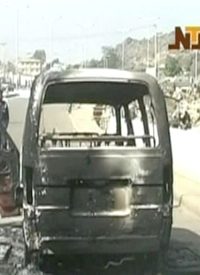
As reported for The New American yesterday, Ihejirika initially claimed that the murderous attacks were “a very unfortunate incident,” even as Christian leaders around the world — including Pope Benedict XVI and Archbishop of Canterbury Rowan Williams — called upon the faithful to keep the persecuted church in their prayers. Now, the gloating of the Boko Haram Jihadists appears to clarify the character of the terrorist attacks as a direct assault by Muslims on Christians during one of the holiest seasons of the Christian calendar.
Boko Haram (a name which reportedly means, “Western education is a forbidden by Islamic law”) has a history of terrorism. According to an Associated Press report, the Nigerian government thought it had eliminated the organization in 2009:
The radical Muslim sect was thought to be vanquished in 2009. Nigeria's military crushed its mosque into concrete shards, and its leader was arrested and died in police custody.
But now, a year later, Maiduguri and surrounding villages again live in fear of the group, whose members have assassinated police and local leaders and engineered a massive prison break, officials say. Western diplomats worry that the sect is catching the attention of Al Qaeda's North Africa branch. It remains unclear what, if any, formal links Al Qaeda in the Islamic Maghreb has made with the sect.
Boko Haram says it has changed it name to: "The organization of followers of the teachings of Prophet Muhammad and champions of Islam and holy wars."
In other words, in the assessment of some experts, Boko Haram is believed to be one more example of an indigenous Jihadist organization which has now risen to sufficient prominence that Al Qaeda may seek to integrate Boko Haram’s terrorist acts under a common front. However, other analysts have already considered the two groups to be formally linked for at least six months.
A Washington Post story on Boko Haram days before the latest bombings credits a cable released on the WikiLeaks website with analyzing the possibility that Nigeria could become a “future Pakistan”:
Western diplomats are concerned that the sect is catching the attention of al-Qaida's north Africa branch. They also worry that Boko Haram represents chaos and disintregation in Nigeria, Africa's most populous nation and one of the top suppliers of crude oil to the United States.
"It is possible that Nigeria could be a future Pakistan," a leaked cable released by the WikiLeaks website quotes U.S. Assistant Secretary of African Affairs Johnnie Carson as saying earlier this year. "In 25 years, there could be impoverished masses, a wealthy elite and radicalism in the north. The question is whether the oil wells will be dry as well."
The cable later adds: "Nigeria is at a critical financial and political threshold and the entire nation could possibly tip backwards permanently."
With oil industry experts already forecasting that gasoline could reach five dollars a gallon in the United Stated by the end of 2012, the implications of a “chaos and disintegration” in Nigeria clearly extend far beyond the nation’s borders. But it must also be observed that the unifying theme to the chaos in Pakistan and Nigeria is the Islamic ideology.
Last March, UN Secretary General Ban Ki-moon and U.S. Secretary of State Hillary Clinton called for calm and restraint when 500 Nigerian Christians were slaughtered. As AFP reported at the time:
The UN chief said he was "deeply concerned".
"I appeal to all concerned to exercise maximum restraint," he said.
"Nigeria's political and religious leaders should work together to address the underlying causes and to achieve a permanent solution to the crisis in Jos."
US Secretary of State Hillary Clinton urged "all parties to exercise restraint", but also called on the Nigerian Government to "make sure the perpetrators are brought to justice."
"The Nigerian Government should ensure that the perpetrators of acts of violence are brought to justice under the rule of law and that human rights are respected as order is restored," the chief US diplomat said. …
"We have over 500 killed in three villages and the survivors are busy burying their dead," said state information commissioner Gregory Yenlong.
"People were attacked with axes, daggers and cutlasses — many of them children, the aged and pregnant women."
The terrible consequences of a government which has thus far failed to eliminate the Jihadist threat within the borders of its own nation combined with distant expressions of vague concern which are usually wedded to invocations of the "peaceful" character of Islam are a recipe for further horrific events in the future. What is not needed is international interference — let alone by the United Nations — but a global and national recognition of the pervasive character Jihadism within the global Islamic community and decisive action by the government of Nigeria in ending the threat of Jihadist violence.
Photo: In this image taken on Dec. 25, 2010, a burned out van is seen on a road following violence in Jos, Nigeria: AP Images



